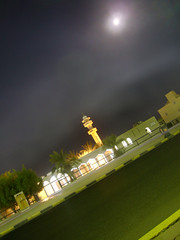It's makes me sad when I see how Baghdad ended up when I watched those two videos.
31 October, 2006
Baghdad :: House of Wisdom
24 October, 2006
The celebration lasts for three days (sometimes four), but if it falls in the middle of the week, shops and schools may stay closed for the entire week.
18 October, 2006

Does Bush Think War with Iran Is Preordained?
By Chris Hedges, Truthdig. Posted October 10, 2006.
(Photo source the original article)
The Christian right sees an apocalyptic nuclear war with Iran as a vision set forth in the Bible. Bush himself may be a believer, too.
The aircraft carrier Eisenhower, accompanied by the guided-missile cruiser USS Anzio, guided-missile destroyer USS Ramage, guided-missile destroyer USS Mason and the fast-attack submarine USS Newport News, is, as I write, making its way to the Straits of Hormuz off Iran. The ships will be in place to strike Iran by the end of the month. It may be a bluff. It may be a feint. It may be a simple show of American power. But I doubt it.
War with Iran -- a war that would unleash an apocalyptic scenario in the Middle East -- is probable by the end of the Bush administration. It could begin in as little as three weeks. This administration, claiming to be anointed by a Christian God to reshape the world, and especially the Middle East, defined three states at the start of its reign as "the Axis of Evil." They were Iraq, now occupied; North Korea, which, because it has nuclear weapons, is untouchable; and Iran. Those who do not take this apocalyptic rhetoric seriously have ignored the twisted pathology of men like Elliott Abrams, who helped orchestrate the disastrous and illegal contra war in Nicaragua, and who now handles the Middle East for the National Security Council. He knew nothing about Central America. He knows nothing about the Middle East. He sees the world through the childish, binary lens of good and evil, us and them, the forces of darkness and the forces of light. And it is this strange, twilight mentality that now grips most of the civilian planners who are barreling us towards a crisis of epic proportions.
These men advocate a doctrine of permanent war, a doctrine which, as William R. Polk points out, is a slight corruption of Leon Trotsky's doctrine of permanent revolution. These two revolutionary doctrines serve the same function, to intimidate and destroy all those classified as foreign opponents, to create permanent instability and fear and to silence domestic critics who challenge leaders in a time of national crisis. It works. The citizens of the United States, slowly being stripped of their civil liberties, are being herded sheep-like, once again, over a cliff.
But this war will be different. It will be catastrophic. It will usher in the apocalyptic nightmares spun out in the dark, fantastic visions of the Christian right. And there are those around the president who see this vision as preordained by God; indeed, the president himself may hold such a vision.
The hypocrisy of this vaunted moral crusade is not lost on those in the Middle East. Iran actually signed the Nuclear Non-Proliferation Treaty. It has violated a codicil of that treaty written by European foreign ministers, but this codicil was never ratified by the Iranian parliament. I do not dispute Iran's intentions to acquire nuclear weapons nor do I minimize the danger should it acquire them in the estimated five to 10 years. But contrast Iran with Pakistan, India and Israel. These three countries refused to sign the treaty and developed nuclear weapons programs in secret. Israel now has an estimated 400 to 600 nuclear weapons. The word "Dimona," the name of the city where the nuclear facilities are located in Israel, is shorthand in the Muslim world for the deadly Israeli threat to Muslims' existence. What lessons did the Iranians learn from our Israeli, Pakistani and Indian allies?
Given that we are actively engaged in an effort to destabilize the Iranian regime by recruiting tribal groups and ethnic minorities inside Iran to rebel, given that we use apocalyptic rhetoric to describe what must be done to the Iranian regime, given that other countries in the Middle East such as Egypt and Saudi Arabia are making noises about developing a nuclear capacity, and given that, with the touch of a button Israel could obliterate Iran, what do we expect from the Iranians? On top of this, the Iranian regime grasps that the doctrine of permanent war entails making "preemptive" and unprovoked strikes.
Those in Washington who advocate this war, knowing as little about the limitations and chaos of war as they do about the Middle East, believe they can hit about 1,000 sites inside Iran to wipe out nuclear production and cripple the 850,000-man Iranian army. The disaster in southern Lebanon, where the Israeli air campaign not only failed to break Hezbollah but united most Lebanese behind the militant group, is dismissed. These ideologues, after all, do not live in a reality-based universe. The massive Israeli bombing of Lebanon failed to pacify 4 million Lebanese. What will happen when we begin to pound a country of 70 million people? As retired General Wesley K. Clark and others have pointed out, once you begin an air campaign it is only a matter of time before you have to put troops on the ground or accept defeat, as the Israelis had to do in Lebanon. And if we begin dropping bunker busters, cruise missiles and iron fragmentation bombs on Iran this is the choice that must be faced -- either sending American forces into Iran to fight a protracted and futile guerrilla war or walking away in humiliation.
"As a people we are enormously forgetful," Dr. Polk, one of the country's leading scholars on the Middle East, told an Oct. 13 gathering of the Foreign Policy Association in New York. "We should have learned from history that foreign powers can't win guerrilla wars. The British learned this from our ancestors in the American Revolution and re-learned it in Ireland. Napoleon learned it in Spain. The Germans learned it in Yugoslavia. We should have learned it in Vietnam and the Russians learned it in Afghanistan and are learning it all over again in Chechnya and we are learning it, of course, in Iraq. Guerrilla wars are almost unwinnable. As a people we are also very vain. Our way of life is the only way. We should have learned that the rich and powerful can't always succeed against the poor and less powerful."
An attack on Iran will ignite the Middle East. The loss of Iranian oil, coupled with Silkworm missile attacks by Iran on oil tankers in the Persian Gulf, could send oil soaring to well over $110 a barrel. The effect on the domestic and world economy will be devastating, very possibly triggering a huge, global depression. The 2 million Shiites in Saudi Arabia, the Shiite majority in Iraq and the Shiite communities in Bahrain, Pakistan and Turkey will turn in rage on us and our dwindling allies. We will see a combination of increased terrorist attacks, including on American soil, and the widespread sabotage of oil production in the Gulf. Iraq, as bad as it looks now, will become a death pit for American troops as Shiites and Sunnis, for the first time, unite against their foreign occupiers.
The country, however, that will pay the biggest price will be Israel. And the sad irony is that those planning this war think of themselves as allies of the Jewish state. A conflagration of this magnitude could see Israel drawn back in Lebanon and sucked into a regional war, one that would over time spell the final chapter in the Zionist experiment in the Middle East. The Israelis aptly call their nuclear program "the Samson option." The Biblical Samson ripped down the pillars of the temple and killed everyone around him, along with himself.
If you are sure you will be raptured into heaven, your clothes left behind with the nonbelievers, then this news should cheer you up. If you are rational, however, these may be some of the last few weeks or months in which to enjoy what is left of our beleaguered, dying republic and way of life.
Chris Hedges is the former Middle East bureau chief for The New York Times and the author of "War Is a Force That Gives Us Meaning."



